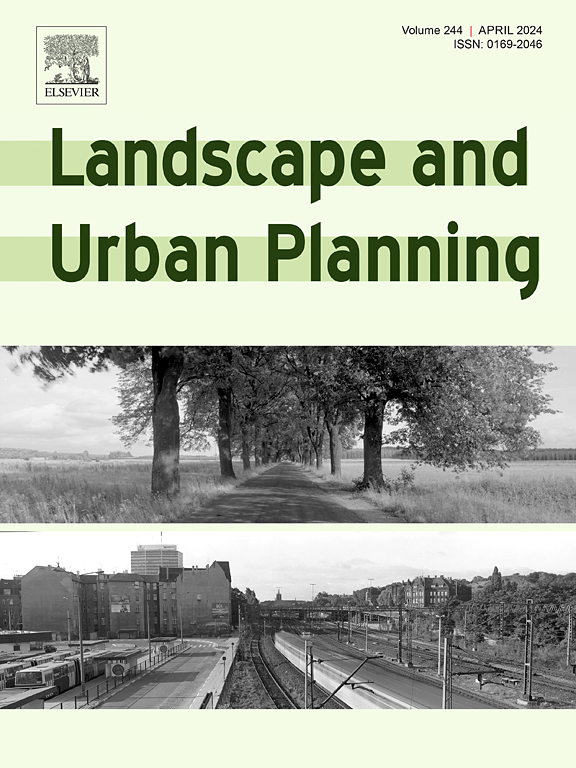探索种族和文化在塑造绿色空间实践中的作用:来自英国布里斯托尔的定性研究
IF 9.2
1区 环境科学与生态学
Q1 ECOLOGY
引用次数: 0
摘要
绿色空间提供了多种福利和社会效益,但少数民族经常限制与这些空间的接触,这加剧了健康不平等。解决这些问题需要详细了解少数民族对绿色空间的看法、偏好和实践的多样性。通过对来自英国布里斯托尔多个少数民族的53人的采访和日记记录的专题分析,我们确定了种族和文化影响绿色空间参与的各种方式。我们发现,文化背景和童年经历在塑造人们对绿色空间的态度方面尤为重要;源自文化遗产和家族历史的跨国视角影响着人们如何感知和适应英国的绿地条件;文化方面的考虑、感知到的排斥和性别与交叉身份相结合,调解了体验和参与模式。我们将理论工作与实践结合起来,对这些发现进行理论化和综合,有助于理解文化和社会因素如何影响绿色空间的使用。我们的研究结果表明,结构化的访问倡议,如同伴领导的步行小组,以及物理环境改造,包括分区和洗涤设施,可以增强绿色空间的文化包容性,同时解决参与的系统性障碍。这些见解为城市规划者和绿地管理者提供了实用的指导,他们希望创造更加公平和包容的空间,以反映和服务日益多样化的社区。本文章由计算机程序翻译,如有差异,请以英文原文为准。
Exploring the role of ethnicity and culture in shaping greenspace practices: A qualitative study from Bristol, UK
Greenspaces provide multiple wellbeing and social benefits, yet ethnic minorities often have restricted engagement with these spaces which reinforces health inequalities. Addressing these requires a detailed understanding of the diversity of ethnic minorities’ perceptions, preferences, and practices relating to greenspaces. Through thematic analysis of interview and diary transcripts from 53 people from multiple ethnic minority groups in Bristol, UK, we identify various ways in which ethnicity and culture influence engagement with greenspaces. We find that cultural background and childhood experiences are particularly important in shaping attitudes towards greenspaces; transnational perspectives originating from cultural heritage and familial history influence how people perceive and adapt to UK greenspace conditions; and cultural considerations, perceived exclusion, and gender combine with intersectional identities to mediate experiences and engagement patterns. We draw from a novel integration of theoretical work on affordances with practices to theorise and synthesise these findings, contributing to understanding how cultural and social factors shape greenspace use. Our findings suggest that structured access initiatives, such as peer-led walking groups, and physical environment modifications, including zoning and washing facilities, can enhance the cultural inclusivity of greenspaces while addressing systemic barriers to engagement. These insights offer practical guidance for urban planners and greenspace managers seeking to create more equitable and inclusive spaces that reflect and serve increasingly diverse communities.
求助全文
通过发布文献求助,成功后即可免费获取论文全文。
去求助
来源期刊

Landscape and Urban Planning
环境科学-生态学
CiteScore
15.20
自引率
6.60%
发文量
232
审稿时长
6 months
期刊介绍:
Landscape and Urban Planning is an international journal that aims to enhance our understanding of landscapes and promote sustainable solutions for landscape change. The journal focuses on landscapes as complex social-ecological systems that encompass various spatial and temporal dimensions. These landscapes possess aesthetic, natural, and cultural qualities that are valued by individuals in different ways, leading to actions that alter the landscape. With increasing urbanization and the need for ecological and cultural sensitivity at various scales, a multidisciplinary approach is necessary to comprehend and align social and ecological values for landscape sustainability. The journal believes that combining landscape science with planning and design can yield positive outcomes for both people and nature.
 求助内容:
求助内容: 应助结果提醒方式:
应助结果提醒方式:


